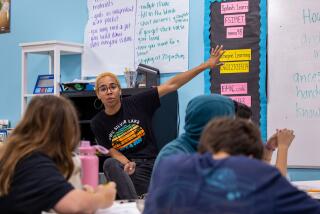TV REVIEW : Too Many <i> Ifs</i> in ‘Climate’
- Share via
“Climate in Crisis,” a documentary about the greenhouse effect that airs at 6 tonight on CNN, is plagued by its choice of words: would, could, if, might. The constant use of these qualifiers underscores the weakness of the show’s premise: Global warming is not a fact--it is just a widely held theory.
The show becomes a series of warnings, sadly short on proof. We see what may happen to polar bears if their food supply is affected by possibly rising temperatures. We see what could happen if the 1988 Midwest farm drought is a harbinger of the future.
And, in one segment, we are shown how rising ocean water is inundating an island off New Guinea--a segment that starts with the narrator, CNN newsman Don Harrison, admitting that this could merely be caused by shifting ocean currents. The segment ends with Harrison labeling the islanders the “first victims” of global warming--a big stretch.
“Climate in Crisis” continues in this vein, finally getting to the meat of the situation (assuming there is a real problem): How do we stop the greenhouse effect? And who will pay?
How to stop it: More nuclear energy, more alternative energy sources, rein in Third World industrialization, plant more forests, reduce pollution. All of these subjects merit their own documentary; all are given short shrift here.
Who will pay: No sweat, we’ll just tag a user tax on industrialized nations so that they pay the true cost of energy.
If the producers--the BBC and ABC Australia--had taken the time to do some research, “Climate in Crisis” might have been a cool voice of reason on a hot subject. Might have been.
More to Read
The complete guide to home viewing
Get Screen Gab for everything about the TV shows and streaming movies everyone’s talking about.
You may occasionally receive promotional content from the Los Angeles Times.






